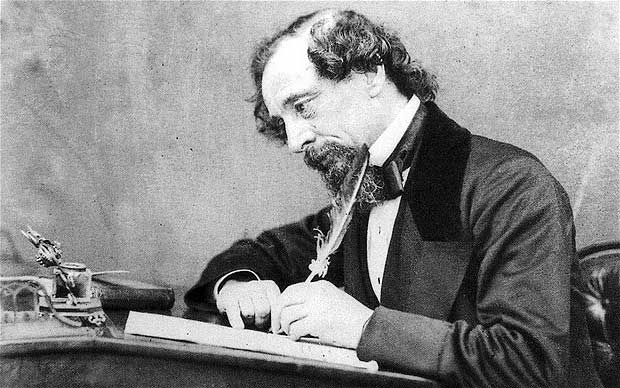Charles Dickens: An Anglo-American Author
CAE Performance Task
Aleanna Dabao, Abigail Grochala, Jillian Villanueva

We've heard the name "Charles Dickens" passed around more than a handful of times, but what do we really know about him? Take a few minutes to read about this great man with the information below.
Charles John Huffam Dickens was an English writer and social critic born on February 7, 1812 in Portsmouth, England. He was the eighth child of his parents, John Dickens and Elizabeth Dickens. Dickens began his education at William Gile’s School, Chatham. He eventually had to stop going to private school in 1824 because his father, John Dickens, was imprisoned after accumulating debt. He later attended Wellington House Academy in London from 1824 to 1827. Because of his father’s imprisonment, Charles was forced to leave school to work in a boot-blacking factory. Charles was later permitted to go back to school after his father paid off his debts with the family inheritance that he received. Dickens once again had to drop out of school in 1827 to work as an office boy in order to make income to support his family. This job later contributed to the start of his career as a writer. The first complete book made by Dickens, Sketches by Boz, caught the eye of his later to be wife, Catherine Hogarth. Together they had 10 children. The two later separated in 1858. In total, Dickens wrote fifteen novels such as Oliver Twist which is about an orphan that’s living in the streets. The novel is based off of Dickens’ early life and how he was forced to leave school and make income with his family with only the wits that he had. He also wrote over twenty short stories and other works including the ever so famous A Christmas Carol, which is about a grumpy old man learning to find the spirit of Christmas with the help of a ghost.
After familiarizing ourselves with Charles Dickens' life story as well as his works, three important things stood out to us.
Charles Dickens is a perfect example of the "rags to riches" idiom. When his father was imprisoned for debt, he reached one of the lowest points of his life, but the remarkable thing is that he never stopped working. He instead strived even harder to be able to support his family and to bring back his father in his life. He did not let his saddening situation burden him, rather, he used it as a motivation to bring him to where he wanted to be, and that is how we must respond to the problems in our lives as well. Our first learning is that nothing should stop us on the road to excellence. We should not let reputation, money, or other people's harsh words push us down, because so long as we persevere for success, we will get there, just like how Charles Dickens did.
Secondly, Charles Dickens froze his life into his writing. This stood out to us, because it means that he was generous enough to share his experiences with us and to give us the chance to read between the lines of his stories so that we can recognize all that needs to be known regarding that story. Generations to come will know of this man as a great writer who had an interesting albeit a bit difficult life, all because of the bits and pieces of him they will find in his stories.
Lastly, we learned that writing is a more powerful tool than we could ever imagine. In Dickens' life, it got him through some of his hardest times. He used writing as an outlet to let out all the emotions he was feeling at his lowest points. He never let anything bring him down, instead he found a way to use these bad experiences to his advantage, and that resulted in his writing. Another way on how Charles' writing changed his life is through his wife. He met his wife because of one of his first pieces ("Sketches by Boz") appealed to her. Through his writing, some of the happiest times of his life were born, as well as most of his loved ones. It is through this that we proved that, at times, the pen truly can be mightier than the sword.
Charles Dickens inspired us through his changing of the bad in his life into good. He turned the sorrow into joy, the ugliness into beauty, and the hate into love. He reminds us all to take everything in stride and always stay on the positive side of things. If you ever seem to be having an intense problem, take the Dickens' way out, find a way to make it beneficial for you and the greater good. After that, all will simply fall into place. Thank you.
SOURCES:
http://www.bbc.co.uk/history/historic_figures/dickens_charles.shtml
http://www.biography.com/people/charles-dickens-9274087#fame
https://en.wikipedia.org/wiki/Charles_Dickens#Early_years

No comments:
Post a Comment